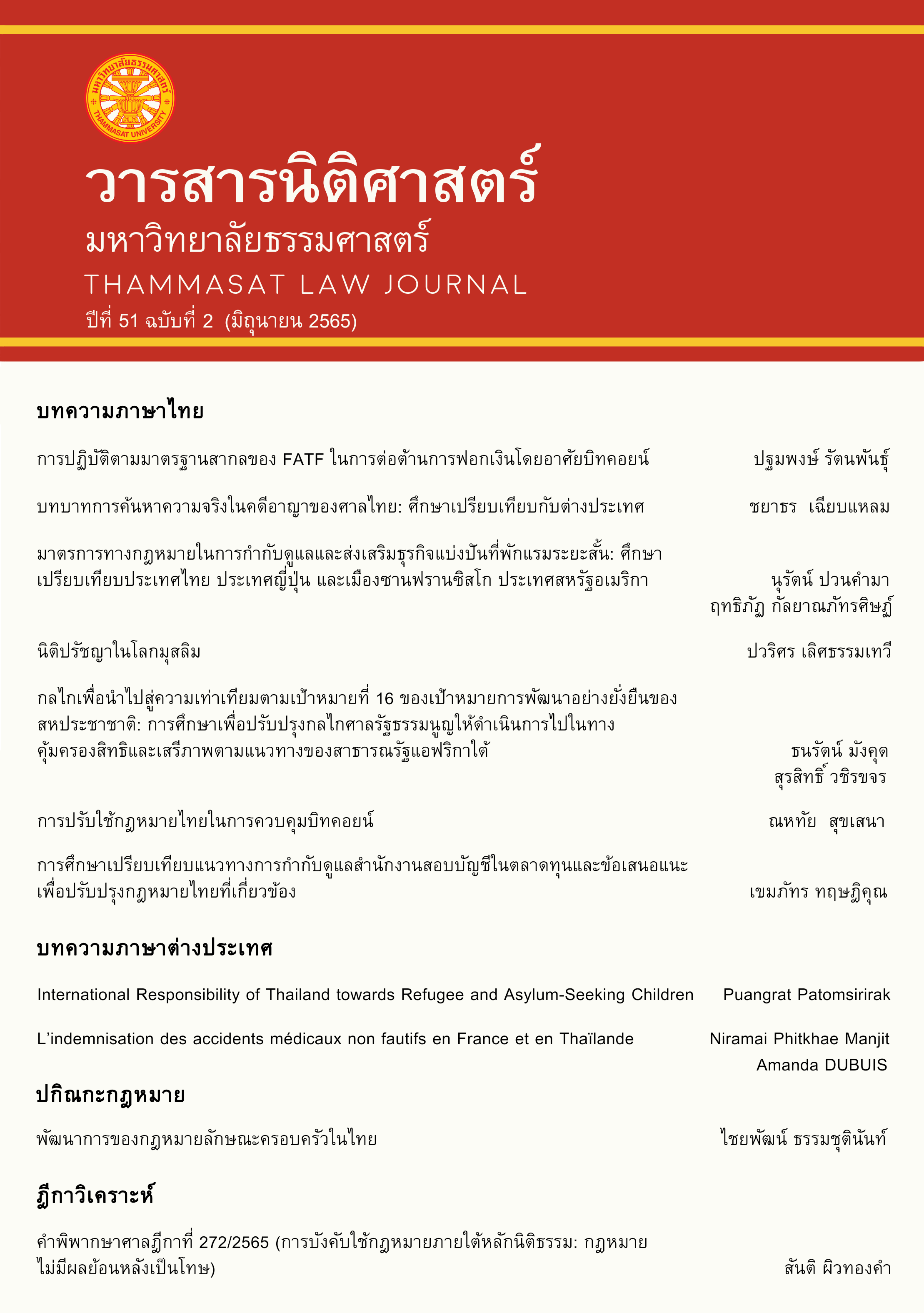นิติปรัชญาในโลกมุสลิม
คำสำคัญ:
นิติปรัชญา, ปรัชญาในโลกมุสลิม, ปรัชญายิว, ปรัชญาสมัยกลางบทคัดย่อ
ในปี ค.ศ. 476 จักรวรรดิโรมันตะวันตก ถูกทำลายและล่มสลายส่งผลให้ความรู้ทางปรัชญากรีกในยุโรปตะวันตกพังทลาย แตกต่างจากโลกอาหรับมุสลิมซึ่งมีนักปรัชญาที่มีชื่อเสียงเกิดขึ้นหลายท่าน ภายหลังพระมะหะหมัดสิ้นพระชนม์ในปี ค.ศ. 632 แอฟริกาเหนือและตะวันออกกลางซึ่งเคยเป็นส่วนหนึ่งของโรมันตะวันตกกลับพัฒนาไปสู่วัฒนธรรมมุสลิมและใช้ภาษาอาหรับ ตรงจุดนี้แสดงให้เห็นถึงอิทธิพลของอารยธรรมมุสลิมและความก้าวหน้าทางปรัชญาและวิทยาศาสตร์เหนือโลกตะวันตกตลอดยุคกลาง บทความนี้กล่าวถึงนิติปรัชญาในโลกมุสลิมเกี่ยวข้องกับปรัชญาการเมือง การจัดรูปแบบการปกครองที่ดี คุณธรรมของผู้ปกครองและกฎหมายอิสลาม ยุคนี้มีนักปรัชญาที่โดดเด่นหลายท่าน แต่นักปรัชญาที่กล่าวถึงมุมมองเกี่ยวกับกฎหมายและการจัดระเบียบการปกครองอย่างเด่นชัด ได้แก่ อัล-ฟาราบี แอวิเซนนา และอาแวร์รูอิส อิทธิพลของมุสลิมต่อโลกตะวันตกแสดงให้เห็นผ่านผลงานทางปรัชญาของนักปรัชญามุสลิม โดยเฉพาะอาแวร์รูอิสซึ่งเป็นผู้เขียนอรรถาธิบายผลงานของอริสโตเติล กล่าวได้ว่า นักปรัชญามุสลิมคือผู้ที่ส่งผ่านปรัชญากรีกของอริสโตเติลสู่โลกตะวันตก นักปรัชญาในโลกตะวันตก อาทิ นักบุญโทมัส อไควนัส ได้ศึกษาอรรถาธิบายปรัชญาอริสโตเติลของอาแวร์รูอิส และนำวิธีการเดียวกันกับอาแวร์รูอิสมาทำให้ปรัชญาไม่เป็นปฏิปักษ์ต่อเรื่องของศรัทธาในศาสนา การศึกษานิติปรัชญาในโลกมุสลิมมิได้จำกัดอยู่เฉพาะนักปรัชญามุสลิม นักปรัชญาชาวยิวอย่างไมโมนิเดสเขียนซึ่งได้รับการยอมรับอย่างกว้างขวาง บทความนี้จึงกล่าวถึงแนวคิดปรัชญาของไมโมนิเดสด้วยเช่นเดียวกัน
เอกสารอ้างอิง
ปวริศร เลิศธรรมเทวี, ‘นิติวิธีว่าด้วยการตีความ: หลักการทั่วไป, กรอบทฤษฎี และแนวปฏิบัติ’ (2560) 46(3) วารสารนิติศาสตร์ มหาวิทยาลัยธรรมศาสตร์, 727–749.
A. Berriedale Keith, A History of Sanskrit Literature (Oxford: Oxford University Press, 1956).
A,C, Grayling, The History of Philosophy: Three Millennia of Thought from the West and Beyond (London: Penguin Books, 2020) 571.
Al-Kindi, On the Quiddity of Sleep and Dreams (873) IX.4.
Al-Farabi, Aphorisms of the Statesmen (Cambridge: Cambridge University Press, 1961) 28.
Al-Farabi (translated by F.W. Zimmermann), Commentary and Short Treatise on Aristotle’s De Interpretatione (London and Oxford: Oxford University Press, 1981).
Al-Farabi, Book of Religion (950) 8–10; Al-Farabi, Political Aphorisms (950) 56; and Al-Farabi, Principles of the Opinions (950) 15.14.
Al-Farabi, The Political Writings (950) 5; ดูคำอธิบายใน Peter Adamson, Philosophy in the Islamic World (Oxford: Oxford University Press, 2016) 74.
Alan Menken, "Arabian Nights’ in Aladdin (Original Motion Picture Soundtrack, 2019).
Aristotle, The Metaphysics (322 BC).
Avicenna, Book of Healing (1014–1020).
Avicenna, Canon of Medicine (1015).
Averroes, Decisive Treatise (1179–1180).
Averroes, Middle Commentary on the Rhetoric (1186) 67:21-68:13.
Averroes, A Commentary on the Canon of Medicine of Avicenna (1198); Averroes, Kulliyay (1198); and Averroes, A Compilation of the Works of Galen (1198).
Charles E. Butterworth, ‘Philosophy of Law in Medieval Judaism and Islam’ in Fred D. Miller, Jr. and Carrie-Ann Biondi (eds), A Treatise of Legal Philosophy and General Jurisprudence (Washington D.C.: Springer, 2015) 217–250.
Dag Nikolaus Hasse, ‘Influence of Arabic and Islamic Philosophy on the Latin West’ in Edward N. Zalta (ed), The Stanford Encyclopedia of Philosophy (Stanford, California: Stanford University Press, 2014).
Deborah L. Black, ‘Mental Existence in Thomas Aquinas and Avicenna’ (1999) 61 Mediaeval Studies, 45–79.
Dimitri. Gutas, Avicenna and the Aristotelian Tradition (Leiden, 1988) 11–19.
Dimitri Gutas, ‘The Meaning of Madani in al-Farabi’s ‘Political’ Philosophy’ (2004) 57 Melanges de l’Universite Saint Joseph, 259–282.
Hugh Kennedy, The Caliphate (London: Pelican Books, 2016).
Hugh Kennedy, The Great Arab Conquests: How the Spread of Islam Changed the World We Live In (Philadelphia, Pennsylvania: Da Capo Press, 2007).
F.W. Zimmermann, Al-Farabi’s Commentary and Short Treatise on Aristotle’s De Interpretatione (London and Oxford: Oxford University Press, 1981).
Fred M. Donner, The Early Islamic Conquests (New Jersey: Princeton University Press, 2014).
John L. Esposito, Islam: The Straight Path (Oxford: Oxford University Pres, 1998) 9-12.
Jon McGinnis, Avicenna (Oxford: Oxford University Press, 2010).
Maimonides, Commentary on the Mishna (1168).
Maimonides, Mishneh Torah (1168–1178).
Maimonides, Guide of the Perplexed (1190).
Maimonides, Treatise on the Art of Logic (1204).
Maimonides, Treatise on the Art of Logic (1204) XIV.
Malcolm C. Lyons (translator), The Arabian Nights Tales of 1001 Nights Vol. 1 – 3 (London: Penguin Books, 2010).
Matteo Di Giovanni, ‘Averroes, Philosopher of Islam’ in Peter Adamson and Matteo Di Giovanni (eds), Interpreting Averroes: Critical Essays (New York and Cambridge: Cambridge University Press, 2018) 9–26.
Mark Cohen, Under Crescent and Cross: The Jews in the Middle Ages (New Jersey: Princeton University Press, 2008).
Mustafa Abu Sway, ‘The Holy Land, Jerusalem and Al-Aqsa Mosque in the Islamic Sources’ (2000) Journal of the Central Conference of American Rabbis, 60-68.
Norman Stillman, The Jews of Arab Lands: A History and Source Book (Philadelphia: Jewish Publication Society of America, 1979).
Peter Adamson, Philosophy in the Islamic World: A Very Short Introduction (Oxford: Oxford University Press, 2015) 4.
Peter Adamson, Philosophy in the Islamic World (Oxford: Oxford University Press, 2016) 55.
Peter Adamson and Matteo Di Giovanni, ‘Introduction’ in Peter Adamson and Matteo Di Giovanni (eds), Interpreting Averroes: Critical Essays (New York and Cambridge: Cambridge University Press, 2018) 1–8.
Richard Burton, The Arabian Nights (San Diego: Canterbury Classic, 2011).
Richard N. Frye, ‘The Sassanians’ in Alan K. Bowman, Peter Garnsey, and Averil Cameron (eds), The Cambridge Ancient History (Cambridge: Cambridge University Press, 2005) 461–480.
Stephanie Dalley, Myths from Mesopotamia: creation, the flood, Gilgamesh and others (Oxford: Oxford University Press, 1989).
Sir Richard Burton, Aladdin and the Magic Lamp (London: Digireads Publishing, 2009).
Simon Ross Valentine, Islam and the Ahmadiyya Jama’at: History, Belief, Practice (New York: Columbia University Press, 2008) 134.
Roger Allen, The Arabic Literacy Heritage: The Development of Its Genres and Criticism (Cambridge: Cambridge University Press, 2005) 280.
Rotraud E. Hansberger, ‘How Aristotle Came to Believe in God-Given Dreams: The Arabic Version of De divination per somnum’ in Monsen Ashtiany (ed), Dreaming Across Boundaries: The Interpretation of Dreams in Islamic Lands (Boston, Massachusetts: 2008) 50–77.
W. Montgomery Watt and Pierre Cachia, A History of Islamic Spain (London and New York: Routledge, 1965) 5-8.
Walter E. Kaegi, Byzantium and the Early Islamic Conquests (Cambridge: Cambridge University Press. 1995).
ดาวน์โหลด
เผยแพร่แล้ว
ฉบับ
ประเภทบทความ
สัญญาอนุญาต
ลิขสิทธิ์ (c) 2022 วารสารนิติศาสตร์ มหาวิทยาลัยธรรมศาสตร์

อนุญาตภายใต้เงื่อนไข Creative Commons Attribution-NonCommercial-NoDerivatives 4.0 International License.
ผลงานที่ตีพิมพ์ในวารสารนิติศาสตร์เป็นลิขสิทธิ์ของวารสารนิติศาสตร์ มหาวิทยาลัยธรรมศาสตร์ และวารสารนิติศาสตร์ มหาวิทยาลัยธรรมศาสตร์ สงวนสิทธิในการเผยแพร่ผลงานที่ตีพิมพ์ในแบบรูปเล่มและทางสื่ออิเล็กทรอนิกส์อื่นใด
บทความหรือข้อความคิดเห็นใด ๆ ที่ปรากฏในวารสารนิติศาสตร์เป็นความรับผิดชอบของผู้เขียนโดยเฉพาะ คณะนิติศาสตร์ มหาวิทยาลัยธรรมศาสตร์ และบรรณาธิการไม่จําเป็นต้องเห็นด้วยหรือร่วมรับผิดชอบใด ๆ



